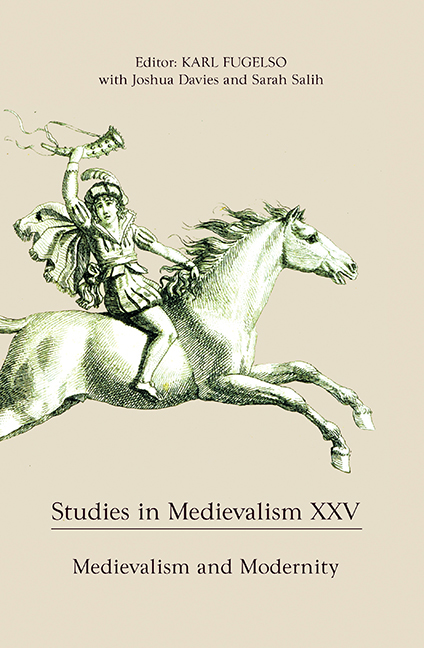Book contents
- Frontmatter
- Studies in Medievalism
- Acknowledgments
- Contents
- List of Illustrations
- Volume XXV 2016
- Editorial Note Karl Fugelso
- I Medievalism and Modernity: Some Perspective(s)
- Medievalism at the End of History: Pessimism and Renewal in Just Visiting
- Medieval Restoration and Modern Creativity
- Crusader Medievalism and Modernity in Britain: The Most Noble Order of Crusaders and the Rupture of the First World War, 1921–49
- From the Republica Christiana to the “Great Revolution”: Middle Ages and Modernity in António Sardinha's Writings (1914–25)
- Moving through Time and Space in Mercedes Rubio's Las siete muchachas del Liceo (1957) via Wagner's Parsifal in Barcelona, Spain (1914)
- II Medievalist Visions
- Contributors
- Miscellaneous Endmatter
Moving through Time and Space in Mercedes Rubio's Las siete muchachas del Liceo (1957) via Wagner's Parsifal in Barcelona, Spain (1914)
from I - Medievalism and Modernity: Some Perspective(s)
Published online by Cambridge University Press: 05 July 2016
- Frontmatter
- Studies in Medievalism
- Acknowledgments
- Contents
- List of Illustrations
- Volume XXV 2016
- Editorial Note Karl Fugelso
- I Medievalism and Modernity: Some Perspective(s)
- Medievalism at the End of History: Pessimism and Renewal in Just Visiting
- Medieval Restoration and Modern Creativity
- Crusader Medievalism and Modernity in Britain: The Most Noble Order of Crusaders and the Rupture of the First World War, 1921–49
- From the Republica Christiana to the “Great Revolution”: Middle Ages and Modernity in António Sardinha's Writings (1914–25)
- Moving through Time and Space in Mercedes Rubio's Las siete muchachas del Liceo (1957) via Wagner's Parsifal in Barcelona, Spain (1914)
- II Medievalist Visions
- Contributors
- Miscellaneous Endmatter
Summary
The dates in this essay's title allude to events in Barcelona between the time of the first authorized production of Wagner's Parsifal outside of Germany and the publication of Mercedes Rubio's novel, Las siete muchachas del Liceo. The medieval parallels with the famed opera underpinning Rubio's novel appear in the plot, themes, and characters as the author recounts strands of protagonist Blanca Galindo's life that align with Parsifal motifs. Blanca is an innocent and naive young woman from Barcelona whose mother has died and whose father is absent, drawing on similarities with Parsifal's family lineage. The girl's early experiences in the city's conservatory, much like Parsifal's initial entry to the grounds of the Monsalvat castle, are shrouded by her obliviousness to the significance of her surroundings and even less awareness of the artist she is to become. Blanca sets out on a path that takes her away from Barcelona, and, during her journey, she acquires the fundamental skills and knowledge that will rank her the top pianist in her country, echoing Spain's decreasing isolation and growing stature in world esteem during Francisco Franco's dictatorship (1939–75). Blanca's innocence also redeems her when she faces criminal charges (and is subsequently found not guilty) for assaulting the conservatory director, Mr. Ramírez, who attempts to sabotage her efforts to attain that top ranking. Ramírez evokes the opera's Amfortas role, suffering not from a wound to his thigh but from a congenital disability affecting his right arm and hand. Blanca's family lineage, the journey motif, and her trial constitute the novel's primary intersections with the Parsifal story.
Rubio's adaptation of Wagner's Parsifal, which is rooted in Wolfram von Eschenbach's Parzival, revolves around her creative contesting of the masculinity ascribed to the titular character, as she assigns the role of the seeker of the grail to the feminine subject Blanca Galindo. Historically speaking, Rubio's narrative encapsulates myriad socio-political circumstances at both the textual and metatextual levels, circumstances that evoke the time period from the monarchy of Alfonso XIII (1886–1931) until midway through Franco's dictatorship.
- Type
- Chapter
- Information
- Studies in Medievalism XXVMedievalism and Modernity, pp. 37 - 44Publisher: Boydell & BrewerPrint publication year: 2016



